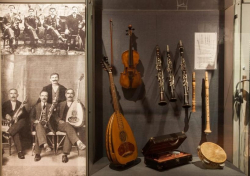Museum of Greek Instruments

Museum of Greek Instruments
The display of the Greek Instruments Museum is organized by the classification made by Von Hornsbostel–Csachs. According to this system the instruments are categorized by their materials and the vibrating movement through which the sound is produced.
All this is housed in the historical Lassanis Mansion, which was built in 1824 close to the Roman Agora.
The objectives of the museum as well as its research center are:
- The collection, conservation and exhibition of folk musical instruments and generally any material useful for research, study and promotion of Greek folk music tradition.
- The promotion of research and study on ethnomusicology, and as documentation and dissemination of traditional music.
- The rescue, study, promotion and dissemination of Greek folk and Byzantine music tradition, both in Greek and in the international arena by any appropriate means.
- Creating special ethno-musicological library and audiovisual library.








